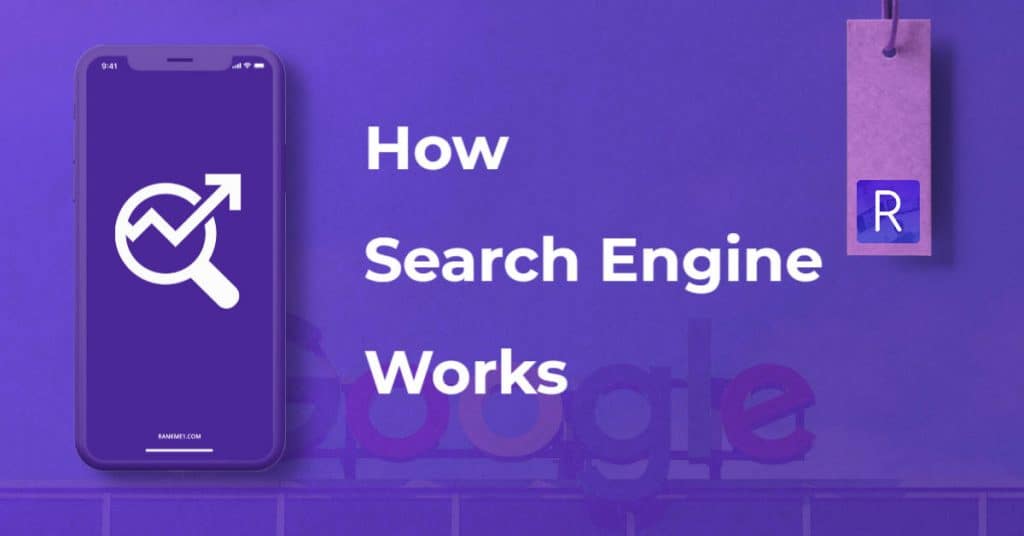Search Engine In The Beginning:
Bruce Clay first published his Search Engine Relationship Chart in 2000.The chart had 26 companies on it: everyone from Yahoo to Magellan to that upstart Google. Fifteen of those companies took their primary results from their own indexes; five of those supplied secondary results to other engines. Without a road map, it was an impossible task to keep it all straight. But over the years, things changed. RankMe1 is One of the Best Digital Marketing Companies in Hyderabad , We Offer Results Oriented Search Engine Optimization, SEM, Social Media Marketing and Many More… Here are Our SEO Packages for Hyderabad .
How Search Engine Works?
The Internet offers a world of information, both good and bad. Almost anything a person could want is merely a few taps on a screen or a couple clicks of a mouse away. Here are Objectives Of Digital Marketing . A good rule for the Internet is if you want to know about something or purchase something, there’s probably already a website just for that. SEO is the Process of Optimizing your Websites for Search Engines.
For Example:
You have a website. You have hired what you hope is a crack team of designers and have unleashed your slick, shiny, new site upon the web, ready to start making money. However, there is a bit of a problem: Nobody knows that your site exists. How will people find your website? The most common way that new visitors will find your site is just through a search engine.
A Search Engine is a web application designed to hunt for specific keywords and group them according to relevance. It used to be, in the stone age of the 1990s, that most websites were found via directories or word-of-mouth. Somebody linked to your website from his website, or maybe somebody posted about it on one of his newsgroups, and people found their way to you.
Search engines such as Google, Yahoo, and Bing were created to cut out the middleman and bring the users to you with little fuss.
A significant amount of all visitor traffic to websites comes from search engines. Unless you are a household name like eBay or Amazon.com, chances are people won’t know where you are unless they turn to a search engine and hunt you down. In fact, even the big brands get most of their traffic from search engines.
It is a fact that people spend money on the Internet in increasing number ,all you need is a credit card, a computer with an Internet connection, and something that you’ve been thinking about buying.
The U.S. Commerce Department reports that in 2014, e-commerce spending in the United States was over $300 billion. Also Americans spend an average of 5 to 6 minutes of every hour online doing online shopping.
On the web, instead of having a prime piece of property, you need a high listing on the search engine results page (SERP). Your placement in these results is referred to as your ranking.
You have a few options when it comes to achieving good rankings. One, you can make your page the best it can be and hope that people will find it in the section of the search results normally referred to as the organic rankings; or two, you can pay to appear in one of the advertising slots, identified on the search results page as ads.
How Do They Get All The Data ?
How do search engines keep track of everything and pop up results so fast?
Gathering the data is the first step. An automated process (known as spidering ) constantly crawls the Internet, gathering web-page data into servers. Google calls its spider Googlebot; you could refer to the data by the processes like spiders, robots, bots, or crawlers, but they’re all the same thing. Whatever you call them, they pull in masses of raw data and do so repeatedly. This is why changes to your website might be seen within a day or might take up to a few weeks to be reflected in search engine results.
In the second step, search engines have to index the data to make it usable. Indexing is the process of taking the raw data and categorizing it, removing duplicate information, and generally organizing it all into an accessible structure.
For each query performed by a user, the search engines apply an algorithm — basically a math equation (formula) that weighs various criteria about a web page and generates a ranking result — to decide which listings to display and in what order. The algorithms might be fairly simple or multilayered and complex. At industry conferences, Google representatives have said that their algorithm analyzes more than 200 variables to determine a web page’s search ranking to a given query.
Finding The Common Threads Among The Search Engines :
● Content: Content is the meat and bones of your website. It’s all the information your website contains, not just the words but also the Engagement Objects (the images, videos,etc)
● Popularity: The Internet is a little like high school in that you are popular as long as a lot of people know you exist and are talking about you. Search engine spiders are looking for how many people are linking to your website, along with the number of outgoing links you have on your own site.
● Architecture: If you walk into a grocery store and find everything stacked haphazardly on the shelves, it’s going to be harder to find things, and you might give up and go to another store that’s better organized and here Spiders does the same thing.
The Major Search Engines :
Major search engines: Google, Bing, and Yahoo, they all measure relevancy a bit differently. Google might rank a page of content as more relevant than Bing does, so Google’s results pages could look quite different from Bing’s results pages for the same search query. Meanwhile, Yahoo uses Bing’s index of the web and ranking algorithm to serve organic and much of its paid search list.
Organic Vs Paid Results :
Organic results are the web pages that the search engines find on their own using their spiders. Paid results (also called sponsored listings ) are the listings that the site owners have paid for. In web searches, paid results usually appear as ads along the top or right side of the window, but they also can appear lower on the page, among or below organic listings.
Yahoo:
In 1994, two electrical engineering graduate students at Stanford University, David Filo and Jerry Yang, created Yahoo, a search engine and network of properties that has undergone much change in its 20-year history.
For many years, Yahoo has outsourced its search function to other providers like Google and, today, Bing. Organic results: In 2010, Yahoo made a deal with Bing to power its search engine and pay per click program. That means that the organic search results in Yahoo use Bing’s ranking algorithm and Bing’s index of the web.
Google:
Google began as a research project by two other Stanford University students, Larry Page and Sergey Brin, in January 1996. They officially incorporated as Google in September 1998.
Organic results: Over time, Google has developed into the powerhouse of the search engine realm. Here are some of the reasons why Google is the king of search engines and shows no signs of giving up the crown:
● Highly relevant: Google’s relevancy is one of its strongest tool to its analysis of site backlinks and on-site content.
● PageRank: PageRank is a famous part of Google’s search algorithm. PR is a numerical weight assigned to a website in order to measure its importance, based on backlinks. Link Building is the Process of Gaining Links from Other Websites.
● Enormous index: Google has indexed billions of pages on the Internet.
● Advanced technology: Google is the undisputed leader. Its algorithms aggressively weed out spam from its results, and its Knowledge Graph far outpaces the other engines capability to understand a searcher’s intent.
Local Search Engines:
A local search engine is an engine specializing in websites that are tied to a limited physical area also known as a geo targeted area. In addition to their main indexes, the major search engines have local-only indexes that they integrate into their main results, like Google My Business and Bing Places.
Learn More : What is Local SEO
Understanding Meta Search Engines :
Metasearch engines do not maintain a database of their own, but instead combine results from multiple search engines.
The metasearch engines today rank very low in total market share compared to the three big players. According to comScore statistics (at the time of writing), Google sites (which include Google search and YouTube) have 67.5 percent of the search market share in the United States and a majority of web searches globally.
After pulling results from multiple search engines, the metasearch engines retain the top ranked results from the separate search engines and present the user with the top results.
This is different from applying an algorithm, as the indexed search engines do.
Using Search As A Research Assistant:
When you start typing a query into a Google search box, you may have noticed that the search engine offers up common searches that start with the letters you’ve already typed. Google is trying to make it easier on searchers by predicting the query they’re looking for. This search enhancement is called Google Instant, and it has been around since 2010. Google Instant has proven to be extra helpful for people using their smartphones to search, because typing on a smartphone’s touchscreen isn’t always easy, and selecting a query from a list of suggestions makes for a good search experience, provided that the query you’re looking for, or something similar, is among the suggestions.
Wanna learn digital marketing? checkout digital deepak digital marketing course


